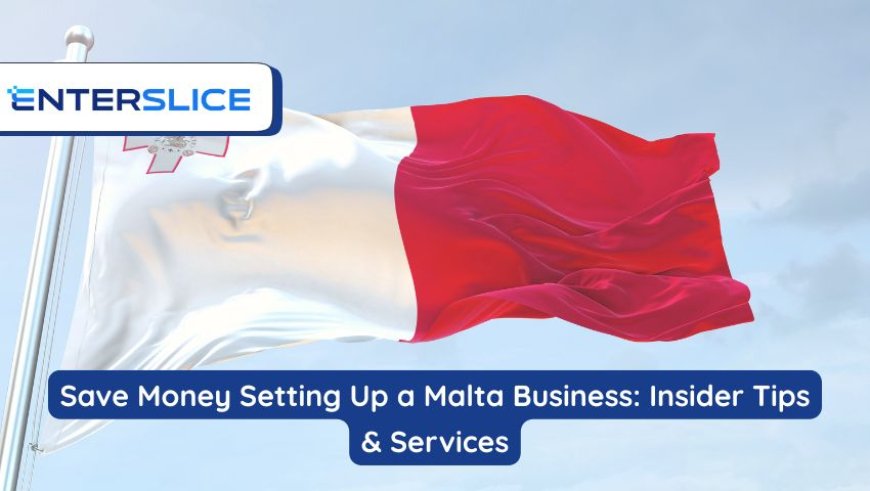Save Money Setting Up a Malta Business: Insider Tips & Services
Looking to register a company in Malta? Discover insider tips to save money on company registration, legal services, and operations when opening a company in Malta.

Malta has long been recognized as a strategic and business-friendly location in the European Union. With its robust legal framework, highly educated workforce, and advantageous tax system, Malta continues to attract international entrepreneurs and investors. However, setting up a companywhile relatively straightforwardcan come with hidden costs if not managed properly.
In this guide, well explore practical ways to save money when opening a company in Malta, provide insight into affordable services, and offer insider tips for managing expenses during and after company registration in Malta.
Why Malta Is a Strong Choice for Business Setup
Despite being a small island nation, Malta offers significant advantages to business owners:
-
EU Member State with full access to the European single market
-
Extensive tax refund system allowing effective corporate tax rates as low as 5%
-
Strong English-speaking legal and professional environment
-
Favorable time zone for international trade
-
Access to over 70 double-taxation agreements
-
Reputable financial services and iGaming sectors
The key appeal of Malta lies in its tax system. While the statutory corporate tax rate is 35%, shareholders may benefit from refunds of up to 6/7 of the tax paid, reducing the effective rate to as low as 5% in many cases. However, achieving these benefits requires proper structuring, compliance, and planning.
Cost-Saving Tips When Registering a Company in Malta
1. Choose the Right Legal Entity for Your Needs
The most common business structure in Malta is the Private Limited Liability Company (Ltd). Its ideal for most small to mid-sized enterprises. However, choosing a structure larger than necessarysuch as a public companycan lead to unnecessary legal, compliance, and audit costs.
Tip: Stick to a private limited liability company unless you have a specific need for public listing or regulated services.
2. Use All-Inclusive Incorporation Packages
Many legal and corporate service providers in Malta offer turnkey incorporation packages that bundle the essential services:
-
Name reservation
-
Drafting of Memorandum & Articles of Association
-
Submission to the Malta Business Registry (MBR)
-
Tax and VAT registration
-
Registered office and company secretary services
Opting for a comprehensive package is often more affordable than paying for each step separately.
Estimated Costs:
Starting from 1,8002,500 depending on the provider and scope.
Tip: Compare at least three providers and verify whether they include the first year of registered address and secretarial services in the price.
Also Process of Online Company Registration in Kuwait
3. Consider a Virtual Office to Lower Rent Costs
Malta law requires companies to maintain a registered office on the island, but a full physical office is not mandatory in the early stages. You can opt for a virtual office to meet legal requirements without the cost of long-term leases.
Many incorporation firms offer this service, which includes:
-
Registered business address
-
Mail collection and forwarding
-
Business phone lines
Tip: Ensure your virtual office complies with local laws and gives a professional appearance to partners and clients.
4. Understand the Tax Refund Process and Plan Accordingly
Malta's imputation system allows shareholders to claim back a significant portion of corporate taxes paid, effectively reducing tax to around 5% in most cases.
However, this process involves:
-
Setting up a Malta Holding Company
-
Ensuring proper tax filings and compliance
-
Paying taxes upfront before receiving the refund
Tip: Work with a local accountant or tax advisor familiar with Maltas refund mechanism to avoid compliance mistakes and unnecessary delays. Some firms offer fixed-fee annual packages for corporate tax management, which can help avoid hourly billing surprises.
5. Leverage Double Taxation Treaties to Reduce Global Tax Burden
Malta has signed over 70 double tax treaties, helping businesses avoid double taxation on international income. If structured correctly, this can significantly reduce the total tax burden for cross-border operations.
Tip: Before opening a company in Malta, consult with an international tax advisor to design a structure that aligns with treaty benefits.
6. Outsource Non-Core Operations
Hiring in-house legal, accounting, or compliance teams in Malta may not be necessary for small to medium-sized businesses. Instead, consider outsourcing:
-
Bookkeeping
-
Payroll
-
VAT returns and corporate filings
-
Legal secretarial work
Several professional firms offer subscription-based services at a fraction of the cost of hiring full-time employees.
Tip: Use cloud-based software to collaborate with these firms remotely and reduce time spent on routine tasks.
7. Take Advantage of Government Incentives and EU Funding
Malta offers a number of government grants and funding schemes for foreign businesses, particularly in sectors like fintech, digital innovation, manufacturing, and green technology.
These may include:
-
Co-financing for equipment or software
-
Employment subsidies for hiring local staff
-
R&D tax credits
Tip: Contact Malta Enterprise or a local business consultant to explore available schemes during the incorporation phase.
Also Read: Requirements for Company Formation in Jordan
Comparing Malta to Other EU Jurisdictions
When considering company registration in Malta, its helpful to compare it to other popular EU jurisdictions like Cyprus, Ireland, or Estonia.
-
Corporate Tax: Maltas effective tax (after refunds) is competitive at 5%10%
-
Incorporation Costs: Generally moderate; cheaper than Ireland, comparable to Cyprus
-
Regulation: A more complex tax refund mechanism but stable and EU-compliant
-
Banking: Stringent due to EU AML requirementscan add time and cost to account opening
Malta remains highly attractive for businesses that prioritize tax optimization and can work within the refund-based system.
Affordable Services That Help New Companies Succeed
To reduce costs and streamline operations, consider the following affordable support services when opening a company in Malta:
-
Company formation agents with multilingual support
-
Accounting & auditing firms offering flat monthly fees
-
Bank account setup assistance, especially with EU-based banks
-
Legal advisors experienced in EU company law and data protection (GDPR)
-
Digital marketing agencies offering cost-effective EU branding services
Many firms offer startup-friendly pricing, particularly for foreign-owned companies aiming to scale gradually.
Conclusion
Malta offers a unique combination of EU access, favorable taxation, and professional infrastructure. However, to register a company in Malta without overspending, its essential to approach the process with a strategic mindset.
By choosing the right company structure, bundling services, leveraging local providers, and understanding the refund-based tax system, entrepreneurs can save significant money when opening a company in Maltawhile positioning themselves for long-term success in the European market.
Frequently Asked Questions (FAQ)
1. How much does it cost to register a company in Malta?
The cost to register a company in Malta typically ranges from 1,800 to 2,500, depending on the package and provider. This includes name reservation, legal documentation, registration with the Malta Business Registry, and one year of registered office service.
2. Can I open a company in Malta as a non-resident?
Yes, non-residents can fully own and operate companies in Malta. The entire registration process can be handled remotely, although local service providers and a registered address are required.
3. Is Malta a tax haven?
No. Malta is a fully compliant EU jurisdiction with robust anti-money laundering laws and tax transparency standards. While it offers an effective tax rate as low as 5% through refunds, these benefits are legal and fully aligned with international tax standards.


































